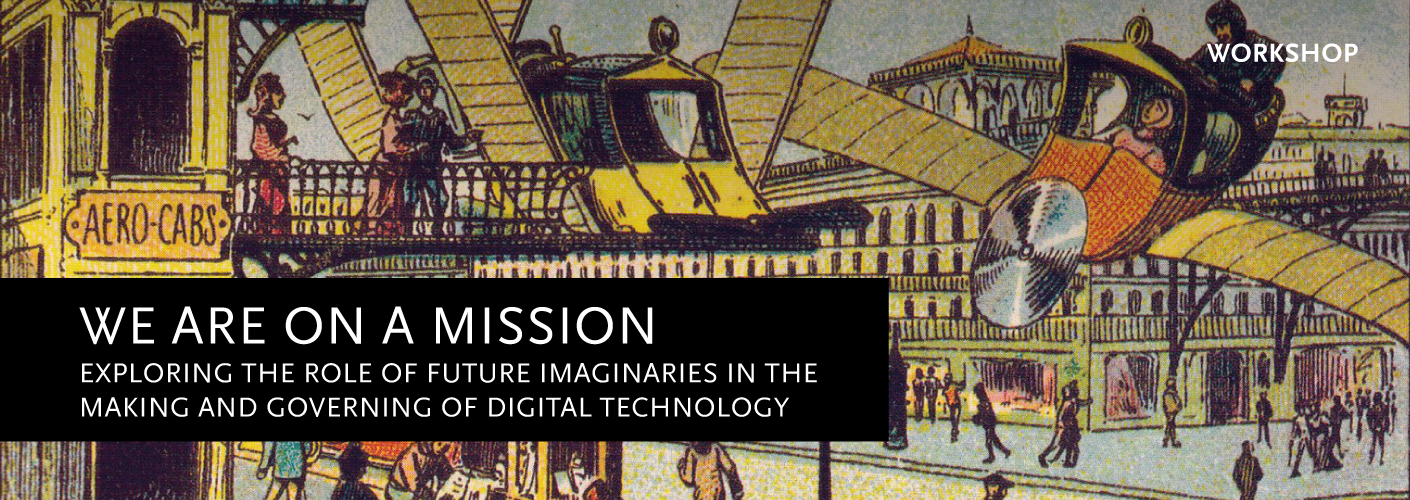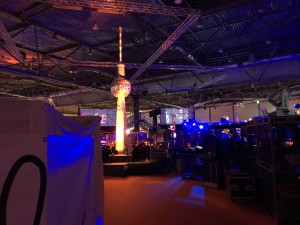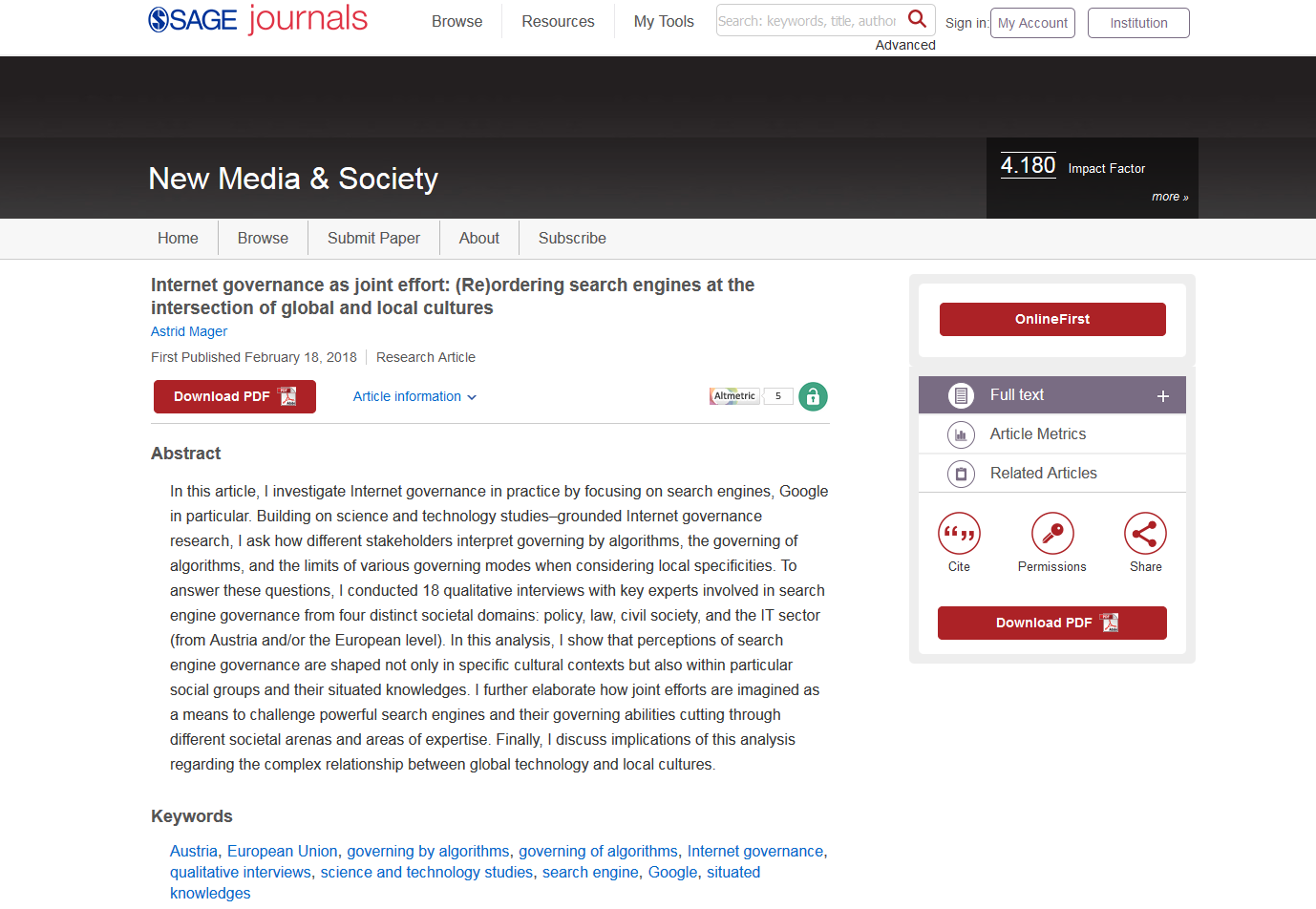Out now: my article “Internet governance as joint effort: (Re)ordering search engines at the intersection of global and local cultures” has just been published by New Media & Society. Or at least in its online first version! I’m very happy about it!! & welcome every feedback or commentary. Here’s the preprint version, if you don’t have access to the journal (or you just send me an email for the original version). yipiiiiehhhh 🙂
Monthly Archives: February 2018
“we are on a mission”
This is great news! I’ll be based in Berlin at the Humboldt Institute for Internet and Society (HIIG) in April and May 2018!!! yay!
As part of this research stay Christian Katzenbach and I are organizing a workshop on the role of future imaginaries in the making and governing of digital technology. It will take place on 27 April 2018 at the HIIG in Berlin. We are really happy that Sally Wyatt (Maastricht University) will hold a keynote!!
 See further details of the workshop here. If you’d like to participate in the workshop, please send an english language abstract (300-500 words) until 2 March 2018 (beware of the tight deadline!!!). We encourage you to also submit work-in-progress.
See further details of the workshop here. If you’d like to participate in the workshop, please send an english language abstract (300-500 words) until 2 March 2018 (beware of the tight deadline!!!). We encourage you to also submit work-in-progress.
Please contact me if you have further questions! We’re looking forward to your contributions!
Here’s the full CfP:
“We are on a mission”. Exploring the role of future imaginaries in the making and governing of digital technology
Call for Abstracts
Deadline: 02.03.2018
Workshop
Friday, 27 April 2018
Alexander von Humboldt Institute for Internet and Society
Französische Straße 9,
10117 Berlin, Germany
Keynote: Sally Wyatt (Maastricht University)
“We are on a mission to build a more open, accessible, and fair financial future, one piece of software at a time” promises the software platform Blockchain. “Imagine if everyone could get around easily and safely, without tired, drunk or distracted driving” envisions the self-driving car company Waymo (a subsidiary of Google’s parent company, Alphabet Inc.). “The Regulation is an essential step to strengthen citizens’ fundamental rights in the digital age and facilitate business by simplifying rules for companies in the Digital Single Market” claims the European Commission with regard to the General Data Protection Regulation.
These examples show how imaginaries of future societies are enacted to promote digital innovations or legitimate certain modes of internet governance. They illustrate how software providers, tech companies and legislators dig into the rich pool of cultural norms, visions and values to support (or question) digital tools, rules and regulations. Future prospects seem to be central for making decisions in the present.
What role do future imaginaries perform in the making and governing of present digital technology? How are they mobilised to push or oppose digital innovations such as artificial intelligence, the internet of things, blockchain technology or open source/open data projects? How are prospective imaginaries shaped in policy discourses and governance practices regarding networked technology and global data flows? What significance do European specificities have in global technology imaginations? Can different mechanisms be identified in mainstream discourses and counter-narratives? What happens if future scenarios are contested and digital promises become contradictory?
Themes of the Workshop
These are central questions to be discussed in our workshop. We welcome theoretical, methodological and empirical contributions that help us understand how the future is mobilized to make and govern digital technology in the present.
The workshop is organized around three central themes:
- Theories and concepts to analytically grasp future visions and their roles in the making and governance of digital technology
- Methods and tools to analyze the nexus between future imaginations and their functions in and impact on policy-making and technology development
- Empirical research and case studies on future imaginaries and their roles in the making and governing of present digital technology
Submission
We welcome theoretical, methodological and empirical contributions from various disciplines that speak to the themes of the workshop. Please send an english language 300–500 word abstract including title that describes your contribution to the workshop. We encourage you to submit work-in-progress.
Abstracts are submitted via e-mail to astrid.mager@oeaw.ac.at before 2 March 2018. We will send out notifications on 13 March 2018.
Organisers
Astrid Mager
Institute of Technology Assessment (ITA), Austrian Academy of Sciences
Elise Richter Fellow, Austrian Science Fund (FWF), project no. V511-G29
astrid.mager@oeaw.ac.at
Christian Katzenbach
Alexander von Humboldt Institute for Internet and Society
katzenbach@hiig.de
#43c3
 This year I had the pleasure to attend the 34C3 – Chaos Communication Congress – in Leipzig. Between Xmas and New Years Eve I gathered with 1500 (!) hackers, nerds and other great people in the Messe Leipzig, which is huge! Thanks to @toyear btw who sold one of his tickets; buying my own was impossible since there were only three particular dates for buying regular tickets and the contingent was sold out immediately.
This year I had the pleasure to attend the 34C3 – Chaos Communication Congress – in Leipzig. Between Xmas and New Years Eve I gathered with 1500 (!) hackers, nerds and other great people in the Messe Leipzig, which is huge! Thanks to @toyear btw who sold one of his tickets; buying my own was impossible since there were only three particular dates for buying regular tickets and the contingent was sold out immediately.
The event was massive in all aspects. Large, glowing art works, huge assemblies of hacker communities, big speakers and wide audiences. I mainly attended to meet up with Michael Christen from the peer-to-peer search engine YaCy. Hanging out with him and Mario Behling – the two of them currently programming Susi.ai – was great fun! Altogether I got a really good insight in their work practices and the community at large. And: everyone was really friendly. Not fake friendly, I mean really friendly. And there were lots of kids too. To sum up, if you are interested in open tech, free software and hacking hardware that’s the place to go. Yes, the most useful thing I learnt there was lock picking!!


